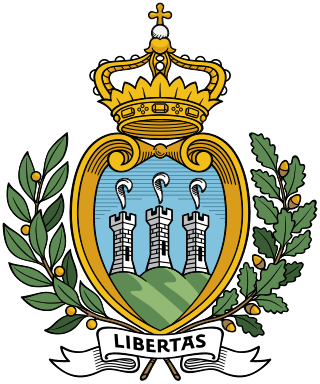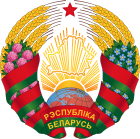
Elections in Venezuela are held at a national level for the President of Venezuela as head of state and head of government, and for a unicameral legislature. The President of Venezuela is elected for a six-year term by direct election plurality voting, and is eligible for re-election. The National Assembly (Asamblea Nacional) has 165 members (diputados), elected for five-year terms using a mixed member majoritarian system. Elections also take place at state level and local level.

France is a unitary semi-presidential republic with a bicameral legislature. Public officials in the legislative and executive branches are either elected by the citizens or appointed by elected officials. Referendums may also be called to consult the French citizenry directly on a particular question, especially one which concerns amendment to the Constitution.

Belarus elects on national level a head of state—the president—and a legislature. The president is elected for a five-year term by the people. The National Assembly has two chambers. The House of Representatives has 110 members elected in single-seat constituencies elected for a four-year term. The Council of the Republic has 64 members, 56 members indirectly elected and eight members appointed by the president.

Bulgaria elects on the national level a head of state—the president—and a legislature. The president is elected for a five-year term directly by the people. The National Assembly has 240 members elected for a four-year term by proportional representation in multi-seat constituencies with a 4% threshold. Bulgaria has a multi-party system in which often no one party has a chance of gaining power alone and parties must work with each to form governments.

Elections in Lithuania are held to select members of the parliament, the president, members of the municipal councils and mayors, as well as delegates to the European Parliament. Lithuanian citizens can also vote in mandatory or consultative referendums.

The Constitution of the Republic of Belarus is the ultimate law of Belarus. The Constitution is composed of a preamble and nine sections divided into 146 articles.

The president of the Republic of Belarus is the head of state and head of government of Belarus. The office was created in 1994 with the passing of the Constitution of Belarus by the Supreme Council. This replaced the office of Chairman of the Supreme Council as the head of state. The tasks of the president include executing foreign and domestic policy, defending the rights and general welfare of citizens and residents, and upholding the Constitution. The president is mandated by the Constitution to serve as a leader in the social affairs of the country and to act as its main representative abroad. The duties, responsibilities and other transitional clauses dealing with the presidency are listed in Chapter Three, Articles 79 through 89, of the Constitution.

A four-question referendum was held in Belarus on 14 May 1995, alongside parliamentary elections. The four issues were the possibility of giving the Russian language equal status with Belarusian, whether new national symbols should be adopted, whether there should be economic integration with Russia and changes to the constitution that would allow early elections if Parliament systematically violated the constitution. According to official results, all four were approved by at least three-quarters of voters, with a turnout of 64.8%.

A seven-question referendum was held in Belarus on 24 November 1996. Four questions were put forward by President Alexander Lukashenko on changing the date of the country's independence day, amending the constitution, changing laws on the sale of land and the abolition of the death penalty. The Supreme Council put forward three questions on constitutional amendments by the Communist and Agrarian factions, local elections and the national finances.

Presidential elections were held in Belarus on 9 September 2001. The election should have been held in 1999, but a revised constitution adopted in 1996 extended incumbent Alexander Lukashenko's term for another two years.

Presidential elections were held in Belarus on 23 June 1994, with a second round on 10 July. They were the first national elections held in Belarus since the country seceded from the Soviet Union three years earlier. The result was a victory for Alexander Lukashenko, who received 80.6% of the vote in the second round. Voter turnout was 79.0% in the first round and 70.6% in the second.

A referendum on the method of the election of the president was held in France on 28 October 1962. The question was whether to have the President of the French Republic elected by direct popular vote, rather than by an electoral college. It was approved by 62.3% of voters with a 77.0% turnout. The reform was controversial because it strengthened the executive at the expense of Parliament, and because of the disputed constitutionality of the procedure used.

Parliamentary elections were held in Belarus on 17 October 2004, with a second round of voting in two constituencies on 27 October, and a third round in one on 20 March 2005. The vast majority of successful candidates, 97 of 109, were independents. Voter turnout was reported to be 91.04% in the first round.
A referendum on joining the European Union was held in Hungary on 12 April 2003. The proposal was approved by 83.8% of voters, with a voter turnout of 45.6%. Hungary subsequently joined the EU on 1 May 2004.

A nationwide referendum was held in Moldova on 5 September 2010 on whether or not the country should amend the Constitution of Moldova to return to direct popular election of the president. Since 2001, the president had been indirectly elected by Parliament, with a supermajority of 61 seats required for election. The voters are asked to answer the following question: "Would you agree with the Constitutional amendment, which would allow the election of the President of the Republic of Moldova by the entire population?" Voters chose one of the proposed options: "Yes (for)" or "No (against)". Of those who had cast their vote, 87.83% chose "Yes". However, the referendum did not pass because only 30.29% of voters turned out, short of the necessary 33% for the referendum to be considered valid.

A referendum on the electoral law was held in San Marino on 3 July 2005. Voters were asked four questions on changes to the electoral law and electoral system. Although all four were approved by a majority of those voting, voter turnout was just 21.7%, meaning that the quorum of 32% of registered voters (10,143) was not achieved for any question. This resulted in all four questions failing, including two that proposed raising the quorum to 40%.
Six referendums were held in Switzerland during 1938. The first four were held on 20 February; the first on amending articles 107 and 116 of the constitution to make Romansch an official language, which was approved by over 90% of voters and all cantons. The second was on a popular initiative "on urgent federal resolutions and the protection of people's rights" and was rejected by 85% of voters. The third was on a popular initiative on the private arms industry, and was also rejected by a wide margin, whilst the fourth was on a counter-proposal to the arms industry question, and was approved by voters. The fifth referendum was held on 3 July on the penal code, and was approved. The sixth and final referendum of the year was held on 27 November on a federal resolution on the transient order of the federal budget, and was approved by 72% of voters.
A referendum is a direct vote in which an entire electorate is asked to either accept or reject a particular proposal. This article summarises referendum laws and practice in various countries.

Presidential elections were held in Belarus on 11 October 2015. Long-term president Alexander Lukashenko ran for his fifth term in office, having won every presidential election since independence in 1991. He was re-elected with 84% of the vote, according to official figures. The 'against all' option received more votes than any opposition candidate.

A constitutional referendum was held in Belarus on 27 February 2022. The referendum was ordered by President Alexander Lukashenko in January 2022. According to political analysts, changes to the Belarusian constitution were intended to solidify the power of Lukashenko's regime after the mass protests in 2020 and 2021, which challenged his rule and was brutally suppressed by police. More than 35,000 people were arrested, 1,070 of whom are acknowledged political prisoners. The changes to Constitution allow Lukashenko to remain in office until 2035 and empower the All-Belarusian People's Assembly, an extra-parliamentary body dominated by government supporters. The changes also renounced Belarus's nuclear-free zone status, allowing Belarus to host nuclear weapons for the first time since the fall of the Soviet Union; the lead-up to the referendum occurred as Russia amassed its troops in both Russia and Belarus in the prelude to the 2022 Russian invasion of Ukraine, and the election itself was held several days after Russia began its military offensive into Ukraine.













